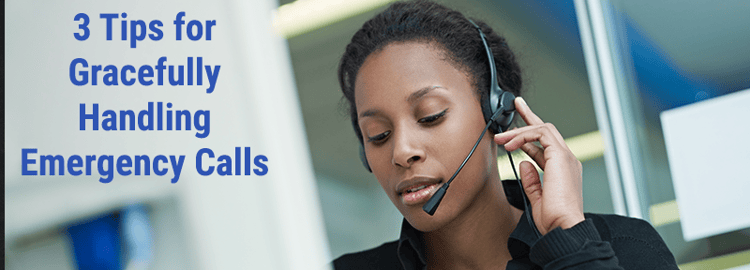
In the world of customer service and call centers, every single phone call is different. The person answering the phone must be prepared for a variety of personalities, challenges and temperaments when the call begins. An emergency call can be especially challenging if the call agent is not prepared. For medical practices and hospitals with regular emergency calls, having a medical answering service gracefully handling the situation is especially important.
Here are a few tips to handle emergency calls with grace:
1. Listen
First and foremost, truly listen to the person on the other end of the receiver. Take note of not only their words, but also how they are speaking. Are they having difficulty speaking English? Do they sound angry or frustrated? Is there panic in their words? Take deep breaths and do your best to remain calm. If you’re calm, your calmness will more than likely affect the caller as well.
Listen to what the caller is telling you. Allow the caller to vent. Don’t make assumptions nor attempt to correct the caller. Do your best to get a good perspective of what has caused the caller to place an emergency call.
2. Communicate
After callers vent or voice their concerns, they will be more willing to listen to what you have to say. Do your best to communicate honestly and sincerely, asking questions to verify your understanding of the situation. If the caller attempts to argue or intimidate, remember to stay calm and listen.
It’s also important to keep in mind that the caller was already upset before the call, so do not react personally. Instead, ask what you can do to help further or offer what options you have to resolve the case. Use an empathetic and caring tone of voice when communicating with the caller. In the caller’s current state, they need to feel as if they are being heard and that their concerns are a priority.
3. Resolve
As a call handler, you should already have resolution options available for callers. Do you forward the caller to someone on call? Do you take a message? In the case of an emergency call, the best option — if you are unable to resolve it yourself — is to get another person on the phone that can. Do not “pass the buck.” Instead, stay on the line to make sure the caller is working with someone who can truly help them.
State specifically what it is that you are going to do to resolve the call for the customer or client. Let them know exactly what you can do, what you can’t do and what they should expect. Once the caller understands that they are in your competent hands, they will more than likely relax. Use phrased questions like:
- “Does that work for you?”
- “Am I making sense?”
- “Are you okay with that?”
Listen again and take note if the caller still feels unsettled. Again, make sure you are listening, communicating effectively and offering options to help the caller feel satisfied that you have done all that you can.
Of course, the right call center can ensure your emergency calls are being handled appropriately. Find the right one and you can feel confident that you are providing the best customer service.
Editor’s note: This post was originally published in March 2015 and has been completely revamped and updated for accuracy and comprehensiveness.
.png?width=135&height=146&name=ABA_Logo_-_June_Picture_Blue_Trademark%20(1).png)


